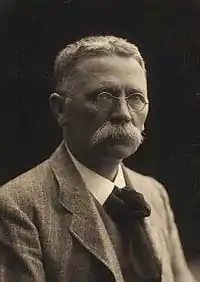1921 in architecture
The year 1921 in architecture involved some significant architectural events and new buildings.
| |||
|---|---|---|---|
| Buildings and structures+... |
Events
- March – Puhl & Wagner are contracted to decorate the interior of the Golden Hall (Stockholm City Hall) with neo-Byzantine mosaics designed by Einar Forseth.
- March 21 – Teatro Yagüez in Puerto Rico, designed by José Sabàs Honoré, reopens.
- May 27 – A Buddha image is enshrined in the main hall of the Daifukuji Soto Zen Mission in Hawai'i, as part of a dedication ceremony for the building.[1]
- September 5 – The Cervantes Theatre in Buenos Aires, Argentina, opens with a production of Lope de Vega's La dama boba.[2]
- Hugo Häring and Ludwig Mies van der Rohe submit a competition entry for a Friedrichstrasse office building, fully made of glass.
- Construction work begins on the Watts Towers in Los Angeles, designed by Simon Rodia.
Buildings and structures
Buildings opened
- January 23 – Ohel Rachel Synagogue in Shanghai, China, designed by Robert Bradshaw Moorhead and Sidney Joseph Halse, is dedicated.
- March 3 – New terminal at the Central railway station, Sydney, Australia, complete with clock tower.[3]
- May 2 – Cunard Building (New York City), designed by Benjamin Wistar Morris with consultants Carrère and Hastings.
- October 26 – The Chicago Theatre movie palace in the United States.[4]
- October 28 – The Theater Pathé Tuschinski movie/live theatre in Amsterdam, designed by Hijman Louis de Jong.
Buildings completed
- The Einstein Tower near Potsdam, Germany, designed by Erich Mendelsohn.[5]
- Berliner Tageblatt, designed by Erich Mendelsohn.
- Harkness Tower in Yale University in New Haven, Connecticut, United States, after 4 years of construction.
- The Corn Palace in Mitchell, South Dakota, United States is completed (except for domes added in 1937).
- The Wong Tai Sin Temple (Hong Kong) is moved to its current site and completed.
- New Hindu Durgiana Temple in Amritsar.
- Michel de Klerk's Het Schip housing development for Eigen Haard in Amsterdam.
- Monument to the March Dead (Denkmal der Märzgefallenen), by Walter Gropius in Weimar, Germany.
- The Mayslake Peabody Estate in Oak Brook, Illinois, United States.
- Wolseley House (showroom and offices), 160 Piccadilly, London, designed by William Curtis Green.
Designs
- Adolf Loos designs a mausoleum for Max Dvořák that is never built.[6]
Awards
Births
- January 15 – Ulrich Franzen, German-born American "Brutalist" architect,[7] in Düsseldorf (died 2012)
- February 26 – Angelo Mangiarotti, Italian architect and industrial designer, in Milan (died 2012)
- March 14 – Ada Louise Huxtable, New York architecture critic and writer (died 2013)
- July 22 – Colin Madigan, Australian architect (died 2011)
- September 6 – Lyubow Demeetriyevna Oosava, Russian-born Belarusian architect (died 2015)
Deaths
- March 3 – Pierre Cuypers, Dutch church and museum architect (born 1827)
- May 18 – Martin Nyrop, Danish architect of Copenhagen City Hall (born 1849)[8]
- June 1 – Sir Robert Rowand Anderson, Scottish Victorian architect (born 1834)
- December 10 – George Ashlin, Irish ecclesiastical architect (born 1837)
References
- "Historic Places in Hawaii County" (PDF). official state web site. Retrieved 2010-04-19.
- Teatro Cervantes (in Spanish)
- "Central Station - in-depth history". Sydney Trains. Government of New South Wales. Archived from the original on 10 August 2013. Retrieved 3 January 2017.
- "Historic Theatres & Movie Palaces of Balaban and Katz: The Chicago Theatre, A Brief History". Uptown Chicago Resources (online). Compass Rose Cultural Crossroads, Inc. 2007. Retrieved June 13, 2014.
- Paul Sigel, Silke Dähmlow, Frank Seehausen und Lucas Elmenhorst, Architekturführer Potsdam – Architectural Guide, Dietrich Reimer Verlag, Berlin 2006, ISBN 3-496-01325-7.
- Masheck, Joseph (2013-05-15). Adolf Loos: The Art of Architecture. I.B.Tauris. p. 254. ISBN 978-1-78076-423-8.
- Vitello, Paul (14 October 2012). Ulrich Franzen, Designer of Brutalist Buildings, Dies at 91, The New York Times
- Funder, Lise (1979). Arkitekten Martin Nyrop. København: Foreningen til gamle Bygningers Bevaring.
This article is issued from Wikipedia. The text is licensed under Creative Commons - Attribution - Sharealike. Additional terms may apply for the media files.

